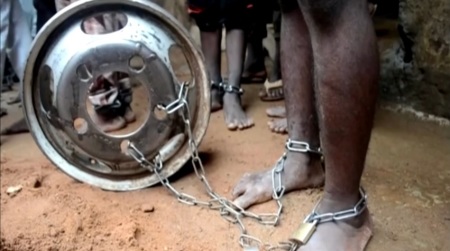Hundreds rescued from Nigerian 'house of torture' posing as Islamic reform school

Hundreds of boys have been rescued from what has been described as a Nigerian “torture house” that posed as an Islamic reform school. Activists say the revelation is an indication more children could be suffering abuses at similar schools nationwide.
Last week, police in the Kaduna state raided a supposed Islamic reform school and rehabilitation center after receiving a tip about suspicious activity. What the authorities found were children as young as 5, chained to metal railings with their feet shackled together.
According to the BBC, as many as 500 men and boys were freed from the facility as a result of the police raid. Many of the victims held captive at the facility showed signs of abuse, torture and starvation.
"The condition under which we found the victims was so dehumanizing, many of them were chained," police spokesman Yakubu Sabo told The Associated Press.
Kaduna Police Chief Ali Janga described the facility as a "house of torture" and a place of human slavery. He told news outlets that eight suspects — most of whom were teachers — have been arrested.
“This place is neither a rehab or Islamic school,” Janga told the press. “You can see it for yourself.”
The children are now being sheltered at a stadium in Kaduna and are slated to be moved to another camp in the Kaduna suburb.
“The state government is currently providing food to the children who are between the ages of 5 and above,” Janga said, according to Reuters.
The victims have recounted their experiences of beatings, torture and sexual abuse inside the center. Many of the children were enrolled in the center by relatives.
One boy appeared to have scars consistent with having been struck with a whip.
"I have spent three months here with chains on my legs," victim Bell Hamza reportedly told Nigerian press, according to the BBC. "This is supposed to be an Islamic center, but trying to run away from here attracts severe punishment; they tie people and hang them to the ceiling for that."
Bell’s statement was seconded by fellow victim Abdalla Hamza.
"If they caught you if you want to run away from this place, they would hang you, they would chain you," Hamza told AFP.
Hassan Yusuf told Reuters that he was sent to the school due to his family’s concerns about his way of life after years of studying abroad. Specifically, Yusuf said, he had become a Christian and “left the Islamic way of life.”
Hassan Mohammed, an uncle of three children sent to the center by their mother after their father died, told Reuters that he became suspicious after he was denied access to the children.
“I begged, they said no, we can’t see these children until three months,” Mohammed recalled. “When we went back home ... we said the only thing now is we should report this issue to the police station, that is exactly what we did.”
To some human rights activists, the revelation at the Islamic reform center in Kaduna is an indication of the type of abuse facing many students sent to private Islamic reform centers across Nigeria and the African continent that are not regulated by governments.
Such institutions are referred to as Almajiri schools, which are common across predominantly Muslim northern Nigeria.
According to AFP, authorities estimate that there are more than 9 million students enrolled in such institutions.
"The latest example from Kaduna represented the worst of the system and very inhumane conditions," Mohammed Sabo Keana, team lead from the Abuja-based NGO Almajiri Child Rights Initiative, told AFP.
"But they are a clear manifestation of what a lot of children go through — including being made to beg on the streets, subjected to violence, sleeping in the worst conditions imaginable and living with terrible sanitation levels."
Rights activists have pushed for the government to end the Almajiri system, contending that children are not receiving a formal education.
According to the Almajiri Child Rights Initiative, children at Almajiri schools have been known to “live in some of the shabbiest conditions imaginable, with many facing nutritional challenges aggravated by daily street begging and next to no jobs or opportunities for Almajiri adults in an increasingly challenging and competitive world.”
In 2018, the initiative launched Almajiri Child Rights Day (May 25) to draw global attention to the plight of Almajiri children.
Earlier this year, the Nigerian federal government indicated that it planned to eventually ban Almajiri schools. However, a ban does not appear to be imminent.
“Any necessary ban on Almajiri would follow due process and consultation with relevant authorities,” Garba Shehu, spokesperson for President Muhammadu Buhari, said in a June statement.
“The federal government wants a situation where every child of primary school age is in school rather than begging on the streets during school hours.”
Follow Samuel Smith on Twitter: @IamSamSmith
or Facebook: SamuelSmithCP





















